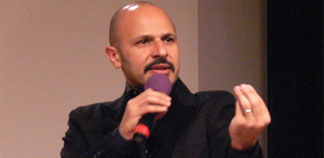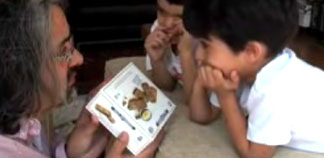به زبان فارسی
PICTORY
LATEST MUSIC
SEARCH
OBAMA
11-Mar-2008 (10 comments)
آقای «باراک حسين اوباما» مطابق رسم آمريکائی ها، هيچگاه نام وسط خود، «حسين»، را بکار نمی برد، هرچند که در کتابی که دربارهء زندگی و افکارش منتشر کرده بود فشرده ای از گذشته و مکنونات خود را بيان داشته است...
مردم آمريکا، طی جريانی کاملاً بی ربط با آقای اوباما، اين اسم را شناخته و نسبت به آن پيشزمينهء ذهنی بشدت منفی دارند. در واقع، طی سال هائی چند، رسانه ها و دستگاه های تبليغاتی آمريکا کوشيده اند تا نام «حسين» (در ارتباط با «صدام حسين») را در افکار عمومی مردم آمريکا با مفاهيمی چون ديکتاتوری، سرکوبگری، ماجراجوئی، تروريسم و مخالفت با دموکراسی و حقوق بشر و نظاير آن يکی کنند. و اکنون مردی پيدا شده است که مردم آمريکا رفته رفته کشف می کنند که «حسين» نام دارد و می خواهد رئيس جمهور آنها باشد.>>>
BELIEFS
10-Mar-2008 (2 comments)
We cannot judge the past from the standards of the present. Everyone will willingly admit this. But every one will not admit the equally absurd habit of judging the present by the standards of the past. The various religions have especially helped in petrifying old beliefs and faiths and customs, which may have had some use in the age and country of their birth, but which are singularly unsuitable in our present age. The past brings us many gifts; indeed, all that we have today of culture, civilization, science, or knowledge of some aspects of the truth, is a gift of the distant or recent past to us. It is right that we acknowledge our obligation to the past>>>
RECOGNITION
10-Mar-2008 (12 comments)
1350 - 1300 BC. Politically Influential Queen Napir Asu, Elam, Khuzistan: Wife of King Untash-Napirasha who built many great buildings and temples in the area including, the Choga Zanbil near Sush (Susa). Her well preserved and headless status was discovered at Susa and is currently at the Louvre Museum in Paris. She is dressed in the same outfit as the Elamite goddess Pinikir and very likely served and represented this divinity at the temple of Ninhursag where she was discovered>>>
PHOTOGRAPHER
10-Mar-2008 (one comment)
The real breakthrough in Kaveh Golestan’s career as an independent photojournalist occurred during Iran’s 1979 revolution. He was honoured with the Robert Capa Gold Medal in 1979 for his coverage of the Islamic Revolution. His photographs from Ruhollah Khomeini’s arrival in Iran in late January 1979 and first public appearances at the Alavi school in Tehran were published in Time magazine. In the summer of 1979, he travelled to Kurdistan, West Azerbaijan, Khuzestan and Turkmen Sahra in the province of Khorasan and documented the first deadly confrontations between Kurds and Turkmens and the recently established armed forces of the Islamic regime>>>
WORDS
09-Mar-2008 (6 comments)
It was only later, long after the events of 9/11, that I finally realised I was a terrorist. The realization did not come easily, or all at once. After all, I had not planted any bombs or hurt anyone (not even verbally). I had not visited secret training camps in Pakistan . I had not even done anything as rash as Samina Malik, who was convicted of Terrorism recently by a British court for writng Poetry about Jihad. (Poetry has always been a dangerous activity, as all tyrants know). No. It was something far more insidious. >>>
WAR
09-Mar-2008 (38 comments)
Bravado, posturing and gnashing of teeth have long characterized US-Iranian relations. For almost thirty years, and in the aftermath of the 1979 Islamic Revolution which brought Ayatollah Khomeini and his small coterie of disciples to power there has been a string of events that have gone to ensure the bad-blood and rancor between these erstwhile allies has continued unabated. Prior to the revolution, Iranians resented the US for the CIA-MI6 orchestrated coup d’etat of 1953 which overthrew the democratically elected Prime Minister, Mohammad Mossadeq and later US support for the dictatorship of the Shah Mohammad-Reza Pahlavi>>>
STORY
09-Mar-2008
It was now dusk but still no sign of Hossein. It was completely unlike him to be so late, knowing Mahin would be stranded in the now deserted streets, her hands full of shopping bags from the Bazaar-e-Reza, the market where she had gotten all her spices and nuts, honey and saffron, enough to last for the month. Mahin started walking a bit down the street, hoping she could meet her husband’s oncoming car. Though she walked with her head held high, striding fast and determinedly despite the heavy bags wearing her down, she felt vulnerable. A woman alone at night, walking around as if… as if…>>>
WOMEN
09-Mar-2008 (6 comments)
اکنون، جوامع متمدن با باروری زن به عنوان امری کاملاً طبيعی و تحسين برانگيز روبرو می شوند؛ روابط جنسی را نيز همين گونه زيبا و طبيعی و زمينی می بينند، پوشش زن را نيز. اکنون تن عريان يک زن همانقدر جاذبه دارد که تن عريان مرد، و گيسوی زن بود و نبودش همانقدر مهم است يا مهم نيست که گيسوی مرد. و چنين است که خانواده ی بشری در قرن بيست و يکم رفته رفته، در متن اين روابط آزاد از توهم، شکل تازه و بديعی بخود می گيرد. و انسان امروز به ابتدای جهان باز می گردد، زن همان «حوا»یی می شود که برای رسيدن به، و پا گذاشتن بر زمين، نافرمانی کرد و شادمانه حتی از بهشت گذشت تا بتواند به راحتی دوست داشته باشد، به راحتی عشق بورزد، و بی ترس و نگرانی از تبعيض زندگی کند و مرد هموزن او همان «آدم»ی باشد که در درک ارزش اين نافرمانی و همسانی با او همراهی و همفکری کند.
>>>
INTERVIEW
07-Mar-2008 (4 comments)
When playwright Sepideh Khosrowjah was two years old her parents gave her a doll, which she immediately destroyed. “Toys were boring,” she says. I can understand why dolls would frustrate a future playwright; there’s nothing inside them. This weekend (March 8,9,14,15,16) Berkeley's Darvag performance company will begin staging Khosrowjah’s Farsi language play, “Dar Soogeh Kazem Ashtari,” (In Memory of Kazem Ashtari) and there is plenty inside the characters [rehearsal photos]. Besides humor, love, cunning, ambition, jealously, shame, and frustration, there is also a surprising secret. It was fun reading the play twice, the second time knowing the characters were hiding something from each other>>>
NUCLEAR
07-Mar-2008 (16 comments)
If there was a time when Iranian analysts and decision makers would question the benefits of continuing to cooperate with the International Atomic Energy Agency, it would be now. The IAEA has allowed systematic US intervention in Iran's nuclear file paving the way to a third round of sanctions. But while US pressure on Iran with the knowledge that no evidence of a covert weapons programme exists, is perhaps in the hope that it will finally force Iran to leave the NPT in protest, Iran seems to be one step ahead and does exactly the opposite. On Monday March 3 rd , the UN Security Council following months of political wrestling voted in favour of a third sanctions resolution against Iran, repeating previous demands to stop uranium enrichment but this time ...>>>
SANCTIONS
07-Mar-2008 (11 comments)
The UN Security Council adopted Resolution 1803 on March 3, after nearly eight months of negotiations. The resolution will have an important symbolic impact, given that the December 2007 U.S. National Intelligence Estimate (NIE) seemed to halt international momentum to pressure Iran, making it unclear whether additional rounds of UN sanctions were even possible. The resolution's near-unanimous passage -- with fourteen members approving and Indonesia abstaining -- will send a strong message to Tehran. Those voting in favor included Russia, China, and South Africa -- all countries with longstanding economic ties to Iran>>>
POETRY
07-Mar-2008 (8 comments)
Holding an armful of lilies
I fly out of the Garden of Eden alone at night to the light
of my own devising, squalling away in a glare, leaving
damned Adam of eye-whites red behind, as the moon soars
on my silvery wings.
POETRY
07-Mar-2008 (3 comments)
If sun were god,
not of everywhere, just here,
how easy it would be
to believe.
How eagerly,
every single morning
we could bask
in its obvious glory. >>>
not of everywhere, just here,
how easy it would be
to believe.
How eagerly,
every single morning
we could bask
in its obvious glory. >>>
RECENT COMMENTS
IRANIANS OF THE DAY
| Person | About | Day |
|---|---|---|
| نسرین ستوده: زندانی روز | Dec 04 | |
| Saeed Malekpour: Prisoner of the day | Lawyer says death sentence suspended | Dec 03 |
| Majid Tavakoli: Prisoner of the day | Iterview with mother | Dec 02 |
| احسان نراقی: جامعه شناس و نویسنده ۱۳۰۵-۱۳۹۱ | Dec 02 | |
| Nasrin Sotoudeh: Prisoner of the day | 46 days on hunger strike | Dec 01 |
| Nasrin Sotoudeh: Graffiti | In Barcelona | Nov 30 |
| گوهر عشقی: مادر ستار بهشتی | Nov 30 | |
| Abdollah Momeni: Prisoner of the day | Activist denied leave and family visits for 1.5 years | Nov 30 |
| محمد کلالی: یکی از حمله کنندگان به سفارت ایران در برلین | Nov 29 | |
| Habibollah Golparipour: Prisoner of the day | Kurdish Activist on Death Row | Nov 28 |














